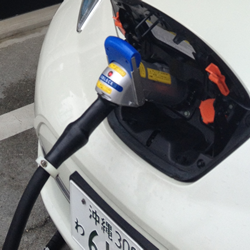
Case Study Report on the 'Electric Vehicle Rental Services: Project in Okinawa, Japan'
[Podcast interview] with report author, Claire Weiller
The first EV rental project in the World for holidaymakers in Okinawa, Japan struggles to make a profit
[Podcast interview] with report author, Claire Weiller
Researchers at the Cambridge Service Alliance at Cambridge University, have suggested new ways of increasing the uptake of electric car usage.
A new paper on a pioneering Electric vehicle rental service for holidaymakers in Okinawa Japan found that low usage has led to a loss for the car rental companies. It is one of the first EV rental projects of its kind in the World and aims to help improve the environmental sustainability of tourism on the island of Okinawa, Japan.
 The search for alternative fuels to reduce car CO2 emissions is an important part of the climate change challenge. In Japan 18 per cent of total CO2 emissions are caused by road transportation, in the EU it is around 12 percent. In China car usage is expected to rise from 43 cars per 1,000 in 2010 to 320 cars per 1,000 in 2035, thereby increasing the pressure to find alternative sources of fuel.
The search for alternative fuels to reduce car CO2 emissions is an important part of the climate change challenge. In Japan 18 per cent of total CO2 emissions are caused by road transportation, in the EU it is around 12 percent. In China car usage is expected to rise from 43 cars per 1,000 in 2010 to 320 cars per 1,000 in 2035, thereby increasing the pressure to find alternative sources of fuel.
The paper called: 'Electric vehicle rental services: Project in Okinawa, Japan', written by PhD researcher Claire Weiller, in collaboration with the Department of Systems Innovation, University of Tokyo, concludes:
“The Okinawa EV rental service at the end of its first three-year operational phase in 2013, missed its initial targets. Low usage rates mean rental companies are making a loss. Customers worry about insufficient recharging infrastructure. Sales of used rental cars are low.”
Ms Weiller suggests an ecosystems approach as this could help turn around the project for others wanting to introduce similar schemes in the future. She continued:
“The information was broken down into all the different components. They were keeping the data to themselves so Nissan kept information about the battery in the car, the travel agents keep information about the customers who book their holidays, but the charging company on the Island, for example, doesn’t have this information, it doesn’t know if the user is just one person or a family. Therefore it was difficult to tailor the service or improve it for the customer.
“If the customer worries about whether they will be able to drive from the airport on the South of the Island to the beaches on the North of the Island, and there is no-one in the value chain able to answer that question they will not feel reassured about the rental service. An ecosystems approach can change that.”
Professor Andy Neely, Director of the Cambridge Service Alliance said: “An ecosystems approach could be beneficial to those involved in the EV scheme in Okinawa, in Japan. All the partners involved need to think about how to capture value from the information they have in order to serve the customer better.”
In a podcast interview Ms Weiller adds: “It is very conceivable that this type of rental service with electric vehicles will be offered by more and more countries, including in the UK where there are plans to develop the charging network to 70,000 stations by 2020.
Notes to Editors: Key facts and figures about this research:
The Rental Service: The Okinawa electric vehicle rental service is an innovative service aiming to provide cleaner transport for tourists and residents on Okinawa Island, Japan. The service was designed in 2009 and began operations in 2011.
The project was proposed by professors at the Department of Systems Innovation, University of Tokyo.
Other organisations involved in the service include: Travel agents. Advanced Energy Company, a joint venture company providing the fast recharging energy infrastructure. Three car rental companies: Nippon Rent-a-car Okinawa, Nissan Rent-a-car Okinawa, and ORIX Rent-a-car Okinawa. Nissan, manufacturers of the Leaf EV. Shiraishi Group, a holding company that owns resorts and Nippon Rent-a-car Okinawa.
Facts: 200 Nissan Leaf EVs are offered in the rental fleet. The Leaf EV has a 160km range.
5.5m tourists visit Okinawa annually half rent a car as part of their holiday package via a travel agent.
Average rental period: 3 days. Average distance driven per rental: 250 km.
Business assumptions: Rental companies – Cost of car: 2.5/3MYen. Assumed resale value after 3 years: 2 MYen ($20,000); Hire price: 6,300 Yen per day; Break-even: 18 rentals; Target: 100 rentals per EV per year.
AEC – Flat service charge: 2,000 Yen for unlimited recharging for a week; Price per recharge beyond first week: 500Y ($5); 27 fast charging stations installed and in operation; Break-even calculated on the basis of 400 EVs: 80 rentals per EV per year.
Challenges: Service performance: Low fleet utilisation rate – 10.6% in 2012 (target: 20%). Willingness-to-pay for used cars on the second-hand market: c. 1.5 MYen ($15,000) per used vehicle (target: $20,000).
Users: Risk for travel agents to promote EV hire due to performance uncertainty. Customer feedback shows concern about the number of charging stations and range of vehicles. Customers charge cars more frequently than projected due to fear of running out.
Suggested Cambridge Service Alliance Solutions: An ecosystem approach, starting from the end-user service experience and working back through the value chain,can help deliver better service value.
Opening and sharing the data from the service operations to all the companies in the value chain can enable a number of improvements to the business model and service, such as: Greater confidence in electric vehicles as a rental car alternative.
Greater willingness of travel agents to promote the electric vehicle option.
Better in-car route planning information relating to range and recharging options.
Increased awareness in the population, leading to more customers for used EVs.
A better foundation to market and promote the service’s merits.
Each one of these solutions should lead to improving the popularity of EVs as a rental car option, resulting in higher.
